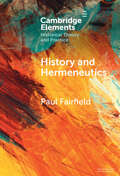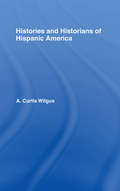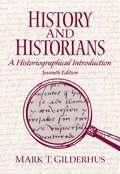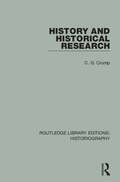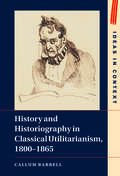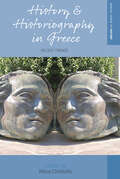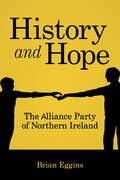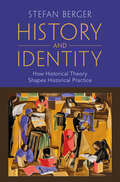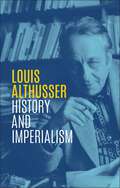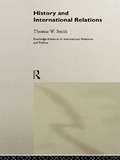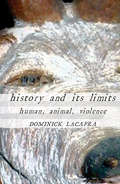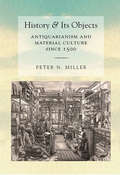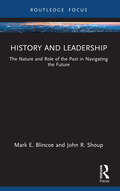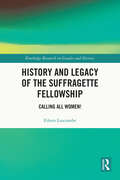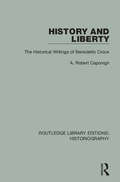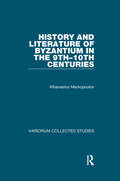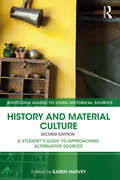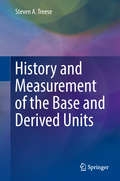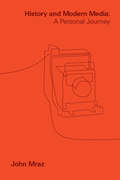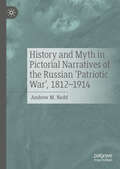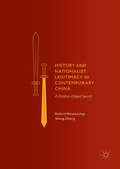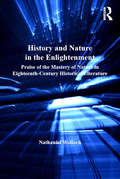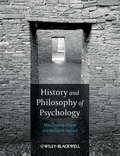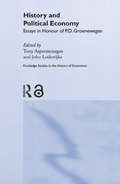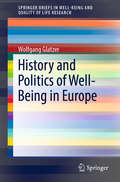- Table View
- List View
History and Hermeneutics (Elements in Historical Theory and Practice)
by Paul FairfieldPhilosophical hermeneutics has shed a good deal of light both upon the methodological underpinnings of the humanities and social sciences generally and in particular upon some fundamental issues in the philosophy of history and history proper. The aim in this Element is to analyze those of its arguments that bear directly upon the latter fields. The principal topics taken up are Dilthey's distinction between understanding and explanation, the accent on meaning and experience, and the sense in which we may be said to belong to history. Heidegger's account of historicity and being-in-the-world, Gadamer's conceptions of historical understanding and belonging, and Ricoeur's view of historians as storytellers also come in for analysis. Other themes include the sense in which we may speak of a dialogue with the past, the notion of historical truth, and the problem of constructivism.
History and Historians: A Historiographical Introduction (7th Edition)
by Mark T. GilderhusThis book presents a survey of Western historiography from ancient times to the present and shows how historians have grappled with the past in a search for meaning and how history as a body of knowledge has served different goals and purposes.
History and Historical Research (Routledge Library Editions: Historiography #11)
by C. G. CrumpAimed at students of history, this volume, originally published in 1928, examines the issues of impartiality and objectivity in the study of history. It also discusses the skills necessary for any would-be historian including the knowledge of foreign languages, the use of sources and note-taking.
History and Historiography in Classical Utilitarianism, 1800–1865 (Ideas in Context #136)
by Callum BarrellThis first comprehensive account of the utilitarians' historical thought intellectually resituates their conceptions of philosophy and politics, at a time when the past acquired new significances as both a means and object of study. Drawing on published and unpublished writings - and set against the intellectual backdrops of Scottish philosophical history, German and French historicism, romanticism, positivism, and the rise of social science and scientific history - Callum Barrell recovers the depth with which Jeremy Bentham, James Mill, George Grote, and John Stuart Mill thought about history as a site of philosophy and politics. He argues that the utilitarians, contrary to their reputations as ahistorical and even antihistorical thinkers, developed complex frameworks in which to learn from and negotiate the past, inviting us to rethink the foundations of their ideas, as well as their place in - and relationship to - nineteenth-century philosophy and political thought.
History and Historiography in Greece: Recent Trends (Making Sense of History)
by Nikos ChristofisAn updated guide to Greek historiography was long overdue. In this comprehensive and temporally wide-ranging reassessment, History and Historiography in Greece examines the evolution of Greek historical scholarship by reviewing the ideas, methods, and schools of history shaping the field. From how these developments correspond with international trends, to their rate of development alongside global shifts in scholarship, this volume identifies not only the ideological limitations shaping Greek academia, but also the innovations that are breaking new ground. In doing so, the contributors illuminate how those developments yield new lessons for existing conceptual frameworks within the fields of labor, gender, diaspora studies, and more.
History and Hope: The Alliance Party of Northern Ireland
by Brian EgginsIn 1970, a group of people had what many commentators felt was a ludicrous dream, that politics in Northern Ireland ‘should not be dominated by division, but should be about co-operation, partnership and reconciliation'. This dream was to become the Alliance Party of Northern Ireland. In the years since, this ambition to overcome tribal politics for a greater good has been preserved, through good times and bad. This book, the first full record of the development of the Alliance Party, charts that journey of hope and of history.
History and Identity
by Stefan BergerThis introduction to contemporary historical theory and practice shows how issues of identity have shaped how we write history. Stefan Berger charts how a new self-reflexivity about what is involved in the process of writing history entered the historical profession and the part that historians have played in debates about the past and its meaningfulness for the present. He introduces key trends in the theory of history such as postmodernism, poststructuralism, constructivism, narrativism and the linguistic turn and reveals, in turn, the ways in which they have transformed how historians have written history over the last four decades. The book ranges widely from more traditional forms of history writing, such as political, social, economic, labour and cultural history, to the emergence of more recent fields, including gender history, historical anthropology, the history of memory, visual history, the history of material culture, and comparative, transnational and global history.
History and Imperialism: Writings, 1963-1986
by Louis AlthusserWritings on History brings together a selection of texts by Louis Althusser dating from 1963 to 1986, including essays, a lecture, notes to his collaborators, and the transcript of an informal 1963 discussion of literary history. The centrepiece of this collection is Althusser’s previously unpublished Book on Imperialism, a theorization of globalized capitalism that remained unfinished. All these writings are concerned with the place of history in Marxist theory and, in particular, on what Althusser considered to be the mortal danger of historicism haunting the revolutionary reading of the present. They testify to his continuing dialogue with the historiography of his day, several of whose representatives were engaged in discussion and debate with him. Deeply interested in history but intent on avoiding the kind of interpretation that would transform it into a deterministic force, Althusser never ceased to reflect on the equilibrium between the historical and the concept in Marxist historiography, an equilibrium that he sought to reinvent for his time. The traces of that undertaking, which continues to generate debate throughout the world today, are brought together in this volume.
History and International Relations: History's Revenge And Future Shock (Routledge Advances in International Relations and Global Politics #97)
by Thomas W. SmithThis book is a major contribution to the debate about philosophy and method in history and international relations. The author analyses IR scholarship from classical realism to quantitative and postmodern work.
History and Its Limits: Human, Animal, Violence
by Dominick LacapraDominick LaCapra's History and Its Limits articulates the relations among intellectual history, cultural history, and critical theory, examining the recent rise of "Practice Theory" and probing the limitations of prevalent forms of humanism. LaCapra focuses on the problem of understanding extreme cases, specifically events and experiences involving violence and victimization. He asks how historians treat and are simultaneously implicated in the traumatic processes they attempt to represent. In addressing these questions, he also investigates violence's impact on various types of writing and establishes a distinctive role for critical theory in the face of an insufficiently discriminating aesthetic of the sublime (often unreflectively amalgamated with the uncanny). In History and Its Limits, LaCapra inquires into the related phenomenon of a turn to the "postsecular," even the messianic or the miraculous, in recent theoretical discussions of extreme events by such prominent figures as Giorgio Agamben, Eric L. Santner, and Slavoj Zizek. In a related vein, he discusses Martin Heidegger's evocative, if not enchanting, understanding of "The Origin of the Work of Art." LaCapra subjects to critical scrutiny the sometimes internally divided way in which violence has been valorized in sacrificial, regenerative, or redemptive terms by a series of important modern intellectuals on both the far right and the far left, including Georges Sorel, the early Walter Benjamin, Georges Bataille, Frantz Fanon, and Ernst Jünger. Violence and victimization are prominent in the relation between the human and the animal. LaCapra questions prevalent anthropocentrism (evident even in theorists of the "posthuman") and the long-standing quest for a decisive criterion separating or dividing the human from the animal. LaCapra regards this attempt to fix the difference as misguided and potentially dangerous because it renders insufficiently problematic the manner in which humans treat other animals and interact with the environment. In raising the issue of desirable transformations in modernity, History and Its Limits examines the legitimacy of normative limits necessary for life in common and explores the disconcerting role of transgressive initiatives beyond limits (including limits blocking the recognition that humans are themselves animals).
History and Its Objects: Antiquarianism and Material Culture since 1500
by Peter N. MillerCultural history is increasingly informed by the history of material culture—the ways in which individuals or entire societies create and relate to objects both mundane and extraordinary—rather than on textual evidence alone. Books such as The Hare with Amber Eyes and A History of the World in 100 Objects indicate the growing popularity of this way of understanding the past. In History and Its Objects, Peter N. Miller uncovers the forgotten origins of our fascination with exploring the past through its artifacts by highlighting the role of antiquarianism—a pursuit ignored and derided by modem academic history—in grasping the significance of material culture.From the efforts of Renaissance antiquarians, who reconstructed life in the ancient world from coins, inscriptions, seals, and other detritus, to amateur historians in the nineteenth century working within burgeoning national traditions, Miller connects collecting—whether by individuals or institutions—to the professionalization of the historical profession, one which came to regard its progenitors with skepticism and disdain. The struggle to articulate the value of objects as historical evidence, then, lies at the heart both of academic history-writing and of the popular engagement with things. Ultimately, this book demonstrates that our current preoccupation with objects is far from novel and reflects a human need to reexperience the past as a physical presence.
History and Leadership: The Nature and Role of the Past in Navigating the Future (Leadership Horizons)
by John R. Shoup Mark E. BlincoeLeaders and managers are rightly tasked to take their organizations and communities to a desired future. They are expected to be forward looking with compelling vision statements. As a result, they are often too busy in the present managing the future to be bothered with the past. Yet it is organizational histories that provide the contexts and clues for the future. History and Leadership: The Nature and Role of the Past in Navigating the Future demonstrates that intentional historical perspective-taking provides a sort-of wisdom for doing business in the present and future and equips leaders to leverage the past to help their organizations thrive. This book appeals to several audiences. It will serve as a supplementary text for undergraduate and graduate students in both the humanities and leadership studies. The book also appeals to practicing leaders and managers who wish to develop their emotional, cultural, and social intelligence by exploring perennial issues and lessons found in well-developed histories. This book also serves as a stand-alone read for a range of professionals who want a more recreational and non-traditional read on history and leadership. The book cultivates an appreciation for history and equips readers to be connoisseurs of history for the betterment of themselves and society.
History and Legacy of the Suffragette Fellowship: Calling all Women! (Routledge Research in Gender and History)
by Eileen LuscombeHistory and Legacy of the Suffragette Fellowship provides a biographical account of the scope and depth of the memory work of the now-forgotten commemorative group the Suffragette Fellowship, active from the 1920s to the 1970s. The Suffragette Fellowship comprised members from the militant suffrage groups known as the Women’s Social and Political Union, the Women’s Freedom League, and the Actress Franchise League. This research provides a comprehensive analysis of the Fellowship’s attempts to form and sustain a collective Suffragette identity across four decades of activity. It considers the legacy of contested histories attached to militant campaigning that pressured Fellowship leaders to take control of the public memory of suffrage history. With close attention given to a neglected piece of feminist history, this book highlights the cultural and political impacts that the Fellowship enacted in their memory of the women’s suffrage movement. Richly illustrated with images of members, artefacts, and publications, this extensive study of the Suffragette Fellowship adds to transnational suffrage histories in the United Kingdom and Australia and will be of interest to scholars in memory studies and women’s history.
History and Liberty: The Historical Writings of Benedetto Croce (Routledge Library Editions: Historiography)
by A R CaponigriA re-newed interest in, and appreciation of, the problems of history, both as the theory of historical process and as historiography became one of the marked characteristics of twentieth century thought and this book discusses Benedetto Croce’s historical writings in that context.
History and Literature of Byzantium in the 9th–10th Centuries
by Athanasios MarkopoulosThe studies reprinted here deal with the Byzantine empire between the 9th and 11th centuries, with a focus on the period of the Macedonian dynasty, and include four translated into English for this volume. They reflect both historical and prosopographical concerns, but Professor Markopoulos's principle interest is in the analysis of literary works and texts. This he combines with the examination of the ideological context of the period, as shaped in the reigns of Basil I and Constantine VII Porphyrogennetos, and the investigation of gender issues and other approaches. The close analysis of the texts shows how, after the close of Iconoclasm, new styles of writing and new attitudes towards the writing of history emerged, for instance in the use of mythological themes, which exemplify the changing intellectual concerns of the time.
History and Material Culture: A Student's Guide to Approaching Alternative Sources (Routledge Guides to Using Historical Sources)
by Karen HarveySources are the raw material of History, but whereas the written word has traditionally been seen as the principal source, historians now recognize the value of sources beyond text. In this new edition of History and Material Culture, contributors consider a range of objects – from an eighteenth-century bed curtain to a twenty-first-century shopping trolley – which can help historians develop new interpretations and new knowledge about the past. Containing two new chapters on healing objects in East Africa and the shopping trolley in the social world, this book examines a variety of material sources from around the globe and across centuries to assess how such sources can be used to study the distant and the recent past. In a revised introduction, Karen Harvey discusses some of the principal issues raised when historians use material culture, particularly in the context of 'the material turn', and suggests some initial steps for those unfamiliar with these kinds of sources. While the sources are discussed from interdisciplinary perspectives, the emphasis of the book is on what historians stand to gain from using material culture, as well as what historians have to offer the broader study of material culture. Clearly written and accessible, this book is the ideal introduction to the opportunities and challenges of researching material culture, and is essential reading for all students of historical theory and method.
History and Measurement of the Base and Derived Units (Springer Series in Measurement Science and Technology)
by Steven A. TreeseThis book discusses how and why historical measurement units developed, and reviews useful methods for making conversions as well as situations in which dimensional analysis can be used. It starts from the history of length measurement, which is one of the oldest measures used by humans. It highlights the importance of area measurement, briefly discussing the methods for determining areas mathematically and by measurement. The book continues on to detail the development of measures for volume, mass, weight, time, temperature, angle, electrical units, amounts of substances, and light intensity. The seven SI/metric base units are highlighted, as well as a number of other units that have historically been used as base units. Providing a comprehensive reference for interconversion among the commonly measured quantities in the different measurement systems with engineering accuracy, it also examines the relationships among base units in fields such as mechanical/thermal, electromagnetic and physical flow rates and fluxes using diagrams.
History and Modern Media: A Personal Journey (Critical Mexican Studies)
by John MrazIn History and Modern Media, John Mraz largely focuses on Mexican photography and his innovative methodology that examines historical photographs by employing the concepts of genre and functions. He developed this method in extensive work on photojournalism; it is tested here through examining two genres: Indianist imagery as an expression of imperial, neo-colonizing, and decolonizing photography, and progressive photography as embodied in worker and laborist imagery, as well as feminist and decolonizing visuality. The book interweaves an autobiographical narrative with concrete research. Mraz describes the resistance he encountered in US academia to this new way of showing and describing the past in films and photographs, as well as some illuminating experiences as a visiting professor at several US universities. More importantly, he reflects on what it has meant to move to Mexico and become a Mexican. Mexico is home to a thriving school of photohistorians perhaps unequaled in the world. Some were trained in art history, and a few continue to pursue that discipline. However, the great majority work from the discipline known as "photohistory" which focuses on vernacular photographs made outside of artistic intentions. A central premise of the book is that knowing the cultures of the past and of the other is crucial in societies dominated by short-term and parochial thinking, and that today's hyper-audiovisuality requires historians to use modern media to offer their knowledge as alternatives to the "perpetual present" in which we live.
History and Myth in Pictorial Narratives of the Russian 'Patriotic War', 1812-1914
by Andrew M. NeddThis book reveals that the visual narrative of the events of the Russian campaign of 1812 was inextricably linked to Russia's search for national identity and helped to form competing definitions of 'Russianness'. No pre-revolutionary military event was more celebrated in Russian literature and art than the ‘Patriotic War of 1812’, during which Napoleon advanced his Grand Armée into Russia, only to retreat months later in defeat as his army faced starvation and capture during the brutal winter. The works of art that retold the story of 1812 extolled virtues that were represented as inherently Russian: courage, resourcefulness, and unity. Furthermore, these values were increasingly contrasted with those of the foreign invader from the west. While the emphasis is largely on academic painting, this book also explores popular media and memorialization in order to reveal the role that images played in the process of constructing identities in nineteenth-century Russia.
History and Nationalist Legitimacy in Contemporary China
by Qiang Zhang Robert WeatherleyThis book examines how the Chinese Communist Party (CCP) has attempted to bolster its nationalist legitimacy through the utilisation of Chinese history. The authors identify two different modes of nationalism - aggressive and consensual - both of which are linked to the historical memory of the late Qing Dynasty and Republican era. Aggressive nationalism dwells on China's traumatic "century of humiliation" and is intended to incite popular resentment towards former imperialist powers (particularly Japan and the US) whenever they are deemed to still be acting in a provocative manner in their dealings with China. The aim is to remind the Chinese people that the CCP liberated China from imperialism after 1949 and has since restored national pride. Consensual nationalism is more conciliatory, emphasising common historical ties with the Guomindang (KMT) during the Second Sino-Japanese War and the Republican era. Here, the CCP is trying to promote itself as the party of national harmony and unity, with the long-term objective being peaceful reunification with Taiwan. However, the public response in China has not always been supportive of the CCP's claims to be the sole defender of Chinese national interests. Some critics have suggested that China would have been better off if the KMT had won the civil war instead of the CCP. Others have insisted that the party is hopelessly weak on issues of national importance and that China is no stronger now than it was during the final throes of the much-hated Qing Dynasty. This book will be of interest to research students and scholars of Chinese politics, history and international relations.
History and Nature in the Enlightenment: Praise of the Mastery of Nature in Eighteenth-Century Historical Literature
by Nathaniel WollochThe mastery of nature was viewed by eighteenth-century historians as an important measure of the progress of civilization. Modern scholarship has hitherto taken insufficient notice of this important idea. This book discusses the topic in connection with the mainstream religious, political, and philosophical elements of Enlightenment culture. It considers works by Edward Gibbon, Voltaire, Herder, Vico, Raynal, Hume, Adam Smith, William Robertson, and a wide range of lesser- and better-known figures. It also discusses many classical, medieval, and early modern sources which influenced Enlightenment historiography, as well as eighteenth-century attitudes toward nature in general.
History and Philosophy of Psychology: Historical And Philosophical Perspectives (History And Philosophy Of Psychology Ser.)
by Michael E. Hyland Man Cheung ChungHistory and Philosophy of Psychology is a lively introduction to the historical development of psychology. Its distinct inclusion of ideas from both Eastern and Western philosophies offers students a uniquely broad view of human psychology. Whilst covering all the major landmarks in the history of psychology, the text also provides students with little-known but fascinating insights into key questions â?? such as whether Freud really cured his patients; what was nude psychotherapy; and were the early psychologists racist? Encourages students to explore the philosophical and theoretical implications of the historical development of psychology Explores key theoretical ideas and experiments in detail, with background to their development and valuable suggestions for further reading
History and Political Economy: Essays in Honour of P.D. Groenewegan (Routledge Studies in the History of Economics)
by Tony Aspromourgos John LodewijksImpressive and authoritative, this essential book brings together a collection of essays in honour of Peter Groenewegen, one of the most distinguished historians of economic thought of a generation. His work on a wide range of economic theorists such as Adam Smith, François Quesnay and Alfred Marshall approaches a level of near insuperability.
History and Politics of Well-Being in Europe (SpringerBriefs in Well-Being and Quality of Life Research)
by Wolfgang GlatzerThis book presents a reconstruction of the history of well-being on the European continent with special attention to the European Union, as people from Europe have a history of a long-term march towards well-being. It discusses ancient civilizations on the European continent, which have contributed significantly to the features of well-being in contemporary Europe. Following Europe`s success over the past millennium, which brought the continent a unique rise to better well-being it also imposed new challenges for sustaining well-being and alleviating misery. It is shown that Europeans attained a high level of well-being in global comparison, yet their attitudes remained at the same time ambivalent and precarious. Significant parts of the population claim a low well-being and suffer from the difficulties of life. Even though a top ranked area of socio-economic development in the world, this book shows that poverty, inequality and hardship remain stable structural problems which have to be overcome in order to avoid significant restrictions for a broad quality of life. But despite all their burdens and hardships, Europeans are among the most prosperous and privileged people in the world.
